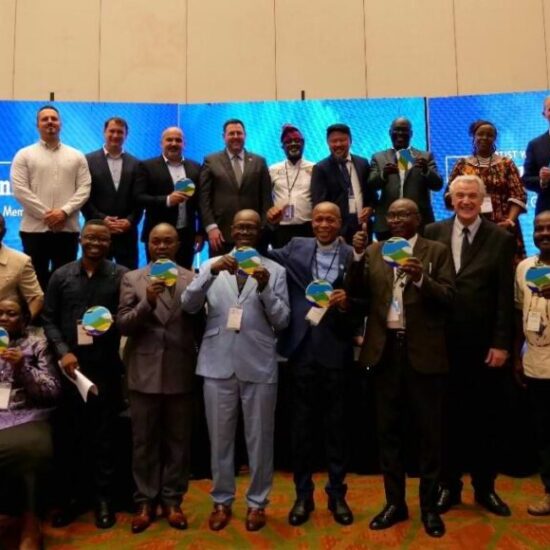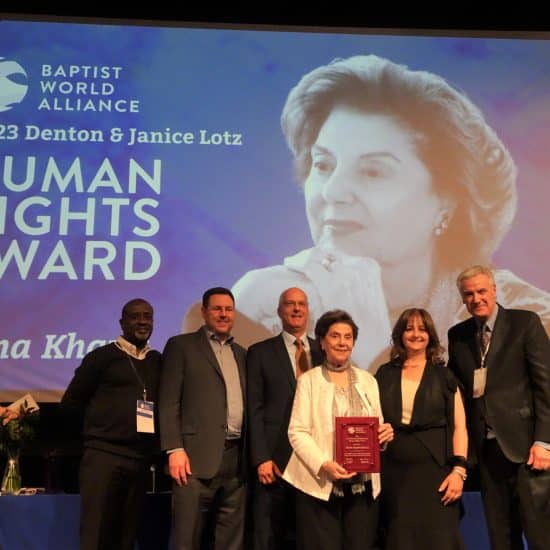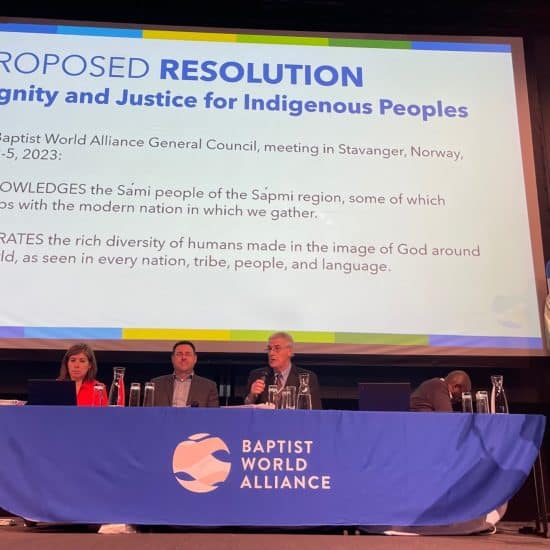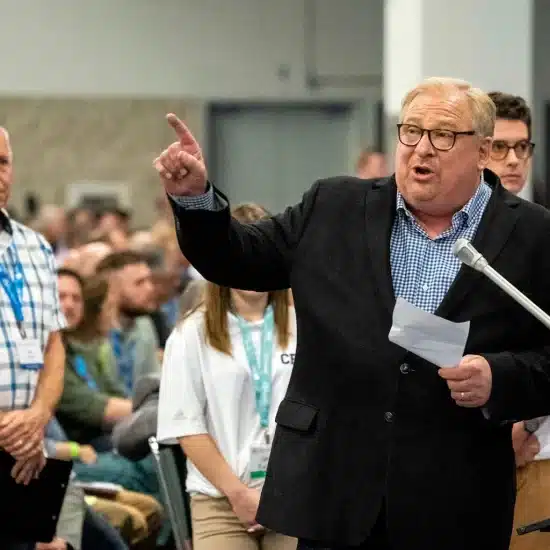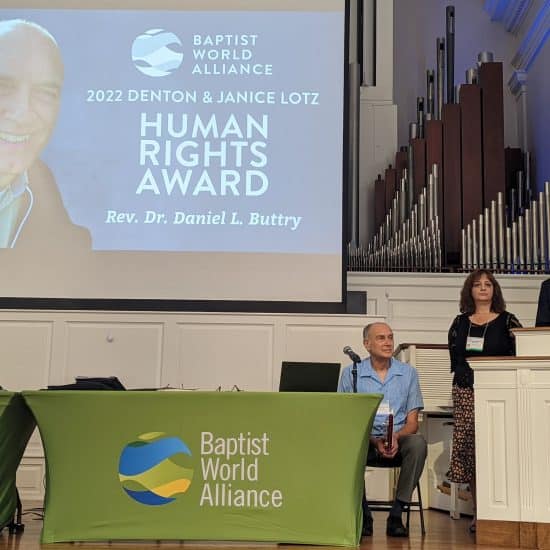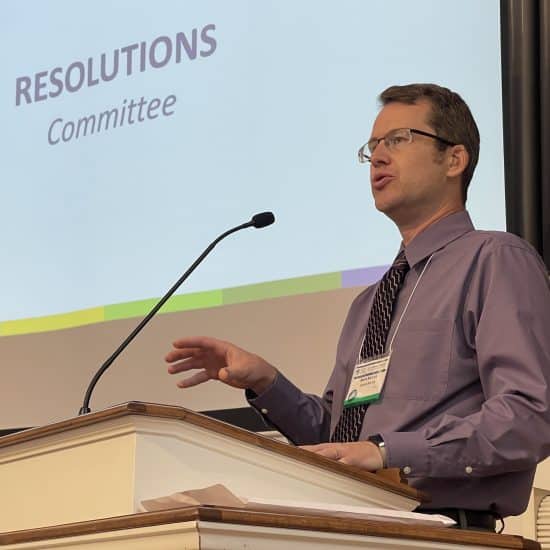At the end of 2017, Neville Callam will retire after more than 10 years as the general secretary of the Baptist World Alliance. Callam is the eighth general secretary (essentially the executive director) since the BWA’s formation in 1905. Originally from Jamaica, he is the first general secretary not from the U.S. or Europe. At the close of the BWA’s 2017 annual gathering in Bangkok, Thailand, in July, Callam sat down for an interview with Word&Way Editor Brian Kaylor. Callam’s new book, “From Fragmentation to Wholeness: Race, Ethnicity and Communion,” was published by Judson Press in July and launched at the BWA gathering.
As you wrap up a decade as BWA general secretary — following years of earlier involvement — there’s probably no one who can answer this question better right now than you: Why do we need the Baptist World Alliance?
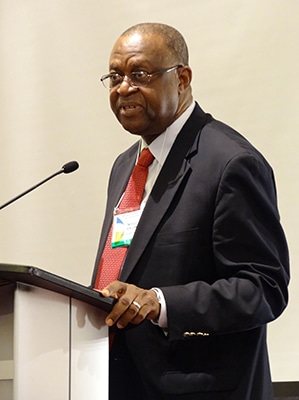 Neville CallamThe same God who speaks to us speaks to others, and therefore we need to be comparing discernments to ensure that we are not being led astray by our own prejudices and inclinations. It is for this reason, fundamentally, that the Baptist World Alliance is necessary. With Baptists sharing a common tradition and a common heritage, affirming the confidence of the congregation to discern the mind of Christ, recognizing that all congregations — because the Spirit is with them — may discern the mind of Christ, Baptist congregations need to hear from each other so we can have checks and balances in regard to what we will confidently assert as the mind of Christ on an issue.
Neville CallamThe same God who speaks to us speaks to others, and therefore we need to be comparing discernments to ensure that we are not being led astray by our own prejudices and inclinations. It is for this reason, fundamentally, that the Baptist World Alliance is necessary. With Baptists sharing a common tradition and a common heritage, affirming the confidence of the congregation to discern the mind of Christ, recognizing that all congregations — because the Spirit is with them — may discern the mind of Christ, Baptist congregations need to hear from each other so we can have checks and balances in regard to what we will confidently assert as the mind of Christ on an issue.
The Baptist World Alliance becomes a space where there can be mutual consultation, where there can be common discernment and confident assertion as to what is the mind and will of Christ precisely because we have the space for that encounter. There is nowhere else in the world where that space is available today except through the Baptist World Alliance. For that reason, I think the Baptist World Alliance is indispensable. If it should go out of existence, something else would need to replace it for the Baptist communion.
And there is one more reason: I believe completely in the unity of the Church as a gift given by God. I believe that unity should be made visible, and that’s our task. By having a Christian world communion called the “Baptist World Alliance,” we leverage the possibility of creating a space in which various Christian world communions participate so that far from relying alone on our discernment as a Baptist community, we may also benefit from the fruit of the discernment of other communities. That’s why I believe in the Baptist World Alliance. That’s why I serve the Baptist World Alliance. In the mind of Christ, there’s one Church; there are multiple ecclesial communities, and by working together they more closely approximate God’s will for the Church in the world.
During your time with the BWA, you’ve visited a lot of countries.
Yes, yes.
I know you don’t have time to cover all of them, but is there one or two visits that stand out that you could share about?
That’s a very difficult question, and I haven’t thought about it. I may give you an answer, and then subsequently believe I could have given you a better answer.
I would mention Estonia, which is perhaps a surprising choice. One of the most secular countries in the world, but a post-Communist country where believers in Christ in the Baptist community — the Union of Free Evangelical and the Baptist Churches in Estonia — are actually diverse. I went to serve with them and they asked me to participate with them in an evangelistic effort in the university city of Tartu in the north of the country. I found it fascinating that the Baptist community is unashamed of its identity as a Christian organization as many in that university city — having been formed in a Communist context or being children of those formed in that Communist context — don’t have a strong sense of the existence of the supernatural, not to mention the purpose of worshiping God. That church is willing to put its reputation at risk in that context to proclaim the Gospel in as creative of a way as possible so that people may have something awaken within them to a sense of the supernatural and eventually perhaps come to meet Jesus Christ for the transformation of their lives. I like that conviction. I like that grasping of the opportunity to present Christ in that context. So, I remember that one very well.
And I also remember — it’s stunning that I’m remembering the smaller places, in terms of Baptist communities — I remember the Baptist Convention of Namibia, a very small group not particularly
well-endowed in terms of theological education, but still yearning to be the Church in that community. And what they did at a meeting I attended with them, when they demonstrated their concern for the underprivileged among them — the poor and the weak — and mobilized the small community they have to pool resources to alleviate need among the very poor in the community. The power of the Gospel and that spiritual yearning to be the face of Christ to the people in great need, that struck me very powerfully. I appreciate that very much.
You can imagine that everywhere is very different, and in all of my travels, everywhere I went, there was something new to learn, there was some other dimension of God’s marvelous love and care that one was to discover. So, there’s a sense in which there’s nothing unique in any particular place except that in every place God is revealing God’s self in marvelous ways. It’s only for us to discern these.
During your tenure, you’ve led the BWA to think carefully about the impact of differences between cultures and languages as we seek to communicate with each other. Through your work with the BWA and the World Council of Churches, how have you learned about the impact of these differences and how a global family has to work through those?
You learn to live with people. You come to appreciate them. You have differences of opinion — differences of conviction, actually — but you discover the grace of God in the life of these people. You begin to realize that there is something marvelous about our common humanity and there is something marvelous about our common new humanity in Christ. If we could treasure that and if we could appreciate that, we would be better able to negotiate the contours of our disagreements and our differences and our distinctives.
We [in the Commission on Faith and Order of the WCC] began to discover that if people came from one region of the world — even though they belonged to different denominational groupings — they were more likely to agree in their interpretation of a particular passage of Scripture than people of a similar denomination somewhere else. The way people experience the reality of God in their context has far more to do with how they understand the Scriptures than some of the things that we believe to be the case in denominational emphases and traditional beliefs in a particular communion. And that made me begin to see that it’s not just that we’re all sharing a common humanity and a common new humanity in Christ, but that there are certain other bonds that influence the way we conduct ourselves that sometimes we are not particularly conscious of. And when we are interpreting what somebody has does, we need to be careful that we do not overreach because we may think we understand them when we have not a clue as to what is happening. I began to be more hesitant in making judgments.
I discovered that in some particular contexts in the BWA, should you hear a person from a country addressing an issue, you could be turned off completely because of the way they spoke — the tone, the tenor, what appears to be the absence of grace — and that is absolutely unrelated to what they mean. That is the way they communicate. When you get to know them, deep in their hearts they are wonderful people — just as loving as those who try a tone that is far more tender, far more sweet, far more compassionate. I recognized that we needed in the BWA to create an opening for us to be far more affirming of other people and far more patient in seeking to understand them and also far more patient in allowing them to understand us so that we could negotiate any kind of differences that we experience ourselves. It has been fantastic to share with others in the process.
One of things I found in the BWA was a dominance of English. I am very concerned when I know people are always struggling in the meetings because the only thing they hear is English. If only we were able to
afford it, that they could speak in their own language, to respond in their own way, we would be so much more enriched. But if the Baptist World Congress in South Africa [in 2015] is anything to go by — I think it was 32 languages that we used there — I think we are improving somewhat. We have a long way to go, but I am confident that this trend will continue.
Is there something you’re particularly looking forward to when you retire at the end of the year?
The main thing on my mind is a time of rest. I need some self-care. After the hectic years in this service — when I really immersed myself in the work and gave myself to it — I need a time just to regain my health. And then after that, I will see what kind of doors are opened.
But if there is one door I am praying God will open — informally — for me is an opportunity to interact with young pastors. My greatest desire is to help young pastors and ministerial students to get excited about the Church, to overcome a judgmental attitude toward the Church that sees only the flaws — and they exist — but to see the Church in its dimensions of its mystery as a Body of Christ, to see the Church in its supernatural essence, to discern and to discover that Church in the historical Church, to recognize the enormous privilege of being a Christian and to recognize and acknowledge the joy of being Christians in community. I want to be opening doors for people to see the marvelous, glorious heritage of the Christian Church. I want to be opening doors for people to just explode with interest and awe and see the goodness of God because I think that if people catch a glimpse of the goodness of God it will just transform their lives. If I can communicate anything to the younger generation of this excitement, I think I could go to my grave in peace.

